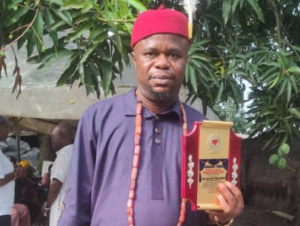New study claims Obeakpu is the correct name, not Ibeakpu.
3 min read
A new study conducted by Mr Desmond Chukwuebuka Amaechi, an indigene of Okparanyiehie Umuasharam in Obeakpu Autonomous Community has shown that the real and correct name of his community is Obeakpu and not Ibeakpu. This claim was made public in a report published by Mr Desmond Chukwuebuka Amaechi and his colleague Mr Chijioke Ngobili who hails from Anambra State but grew up in Umuaka.

In a recent encounter with Umuaka Times on the subject, Mr Amaechi who lives in South Africa disclosed to the South African correspondents of Umuaka Times that he and his colleague arrived at the conclusion after a 3 year intensive research which also involved speaking with some elders of the community. It can be recalled that there has been a sort of controversy over the years on the correct name and pronunciation of the community known as either Obeakpu or Ibeakpu.
In the new study, the duo of Desmond Chukwuebuka Amaechi and Chijioke Ngobili deeply explained and gave their reasons the name of the community should remain Obeakpu and not Ibeakpu. According to them, “akpu” means cassava or cotton. “The Akpụ in the name is not cassava but cotton tree which was popularly called Akpụ-otokolo”, the researchers wrote in their findings. They went further to conclude that “The narrative that brought up Ibeakpu is not consistent with history but an artificial recent creation.”
Driving home their point, the duo claimed that many may not be able to remember the tree in question as it is undergoing instinct.
The accurate name is and has always been Obeakpu. To exemplify this claim the researchers used Umuele to draw another example. “It’s just like Umuele community today that you may not find a single ele in its entire forests despite the animal being the totem of the town.”
Explaining what the name really implies, they described Obeakpu as a place where there is a lot of cassava (akpu) trees just like “ogbe akpụ” in another dialect. The due claimed that “Obe is a variant of Ogbe which means community; a group living together; hood; neighborhood. Remember that the British didn’t have the correct alphabet to represent the “gb” sound and even Igbo was at the time misspelt as Ibo.”
On how cassava came to Igboland, the authors disclosed that it was John Christopher Taylor, one of the early European missionaries to Igboland that introduced cassava to Ndi Igbo in 1857 when he arrived. Hear them: “It has been said that cassava had earlier arrived among the coastal Ìgbò people but among the mainland Ìgbò east and west of the Niger, the spread and popularity of cassava are understood to have started with Taylor’s introduction.”
On the first name of the cassava staple food, the authors claimed that “It was in Ọnịcha, as some early history notes say, that Taylor and Ọnịcha people gave cassava its first known Ìgbò name: MGBADỤGA or MGBADUME (that edible which seemingly chokes when eaten).”
In their research findings, the duo concluded their work thus:
“The word “akpụ́” was originally for cotton/cottonwood (osisi akpụ). As such, there are such geographical identifiers as Isiakpụ in Nsụka, Ọdọakpụ in Ọnịcha, Ọzụbụlụ Ana akpụ in reference to Ọzụbụlụ town after Nnewi, and so on.
An investigation into these places would reveal concentrations of cotton trees and cotton-related activities in the traditional past irrespective of the drastic changes in the present-day landscape, economy and ecosystem of the places.
Also there are such rare Ìgbò names as Ézèakpụ, Okeakpụ, among others — all in reference to cotton/cottonwood specialty/expertise.
Human names with “Akpụ” are almost extinct today owing to the extinction of indigenous cotton and cotton-related activities in Ìgbòland.
It’s strange how and why from around the second half of the 20th century, Ìgbò people seemed to have massively turned around to completely baptize cassava with the name “akpụ” which, in turn, has imposed on the name (akpụ) some derision that one can scorn another saying “I na-esi akpụ akpụ” (you smell cassava). Yet, akpụ—both as a majestic tree and name—was highly revered in Ìgbò cosmology because it was often used in laying lots of early spiritual and metaphysical foundations of communities, families and lineages.”




